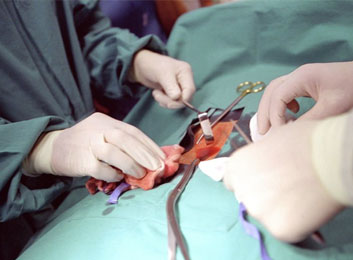Choosing Treatments for Pancreatic Cancer Symptoms
Pancreatic cancer is usually caught too late. Unfortunately, even when caught early, it is a particularly aggressive form of cancer and survival rates are very low. Pancreatic cancer is also a very common form of cancer, particularly in the elderly. Treatment for pancreatic cancer generally includes radiotherapy, surgery and chemotherapy. However, often people are too physically unwell to be able to cope with one or all of these treatments.
Choosing Treatments for Pancreatic Cancer Symptoms – Surgery and Stents
Surgery can sometimes be performed in the early stages of pancreatic cancer in an attempt to remove all of the cancer and potentially cure the patient, or part of the cancer, prolonging the patient’s life and quality thereof. Stents are usually inserted once the cancer blocks either the bowels or the bile ducts, allowing these to once again work and reduce abdominal discomfort and jaundice.
Choosing Treatments for Pancreatic Cancer Symptoms – Radiotherapy and Chemotherapy
Chemotherapy is the recommended treatment in advanced pancreatic cancer in an attempt to slow down or even stop the spreading of the cancer. Chemotherapy will also usually be administered after surgery to remove the cancer. However, chemotherapy is gruelling on the body and will only be offered to those who are well enough to undertake it. As pancreatic cancer is most common in the elderly, it is often felt that their physical condition is not good enough to undergo chemotherapy.
Radiotherapy is a less common treatment of pancreatic cancer and will only be used to try and shrink the tumour and with that reduce pain and discomfort. However, it is not meant as a cure for pancreatic cancer.
Choosing Treatments for Pancreatic Cancer Symptoms – What is best for you?
When you are diagnosed with pancreatic cancer, you will be surrounded by a team of medical experts who will discuss the different treatment options that are available to you. You will play an integral part in choosing the right treatment and you will also be encouraged to seek a second opinion on both the diagnosis and the agreed treatment plan.
Suggested treatment will depend greatly on the stage of the pancreatic cancer and your overall physical health as well as your age. Surgery to treat pancreatic cancer is major surgery and will take a tremendous toll on your body. You will most likely spend some time in intensive care following surgery and you are likely to become diabetic for a period of time at least whilst your pancreas recovers. This means you will require insulin and enzyme replacement therapy following surgery.
Diabetes, even temporary diabetes, is a very dangerous condition, particularly in the elderly. The administration of chemotherapy will depend greatly on whether you are physically well enough to undergo this type of treatment. Chemotherapy will make you feel very sick and weak for prolonged periods of time, which is again a serious issue to take into consideration when offering it as a treatment to the elderly. Radiotherapy is relatively ineffective and is not often suggested when choosing treatments for pancreatic cancer symptoms.

- Home
- Pancreatic Cancer Symptoms
- Check Ups for Pancreatic Cancer Symptoms
- Choosing Treatments for Pancreatic Cancer Symptoms
- Diet and Pancreatic Cancer Symptoms
- Guidance for Pancreatic Cancer Symptoms
- Medication for Pancreatic Cancer Symptoms
- Natural Remedies for Pancreatic Cancer Symptoms
- Pain Management for Pancreatic Cancer Symptoms
- Routine Tests and Pancreatic Cancer Symptoms
- Scans with Pancreatic Cancer Symptoms
- Surgery to Treat Pancreatic Cancer Symptoms
